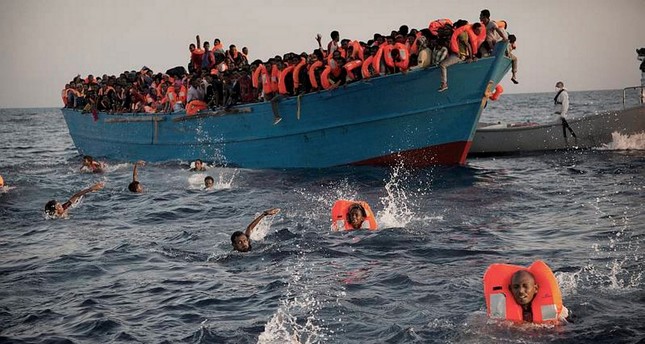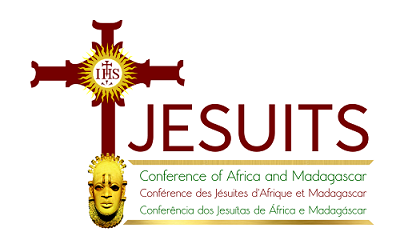Fusing faith and service in Spain

Migrants, mostly Eritrea, jump into the water from a crowded wooden boat as they are helped by members of an NGO during a rescue operation on the Mediterranean, about 21 kilometers north of Sabratha, Libya. (Photo – Daily Sabah)
My name is Ashton Mugozhi. My regency experience in the JCAM-CEP project on migration began in March, 2016. I worked among migrants in Madrid for over 2 years, with the Pueblos Unidos, an organization that falls under the banner of Servicio Jesuita a Migrantes (SJM), a network of Spanish NGOs working with migrants and refugees. This joint project between the conferences of African Jesuit Provincials and the Central European Provincials has its main aim being collaboration in providing pastoral care to the migrants coming to Europe from all over the world.
Just as a body without a spirit is dead, so also faith without works is dead. James 2:14-17
In the spirit of collaboration in this mission, I worked closely with a fellow regent, Tomasz Lipa, from Poland.
In Pueblos Unidos I had the opportunity to participate in the various projects, involving accompaniment of migrants in Madrid. Also with some of the residents of the community in which the office is located called La Ventilla although they were not specifically migrants. Spain does not have refugee camps and so it is an urban refugee setup, whereby migrants drop in and then we were tasked with carrying out interventions. The majority of the migrants were from Latin America and constituted over 95% of the people we served. I will relate here:
• The detention center (Centro de Internamiento de Extranjeros)
• Our residential program called Baobab Project
• Initial orientation classes to migrants who would have just arrived to the center and to Spain
• The Jesuit community as a community of hospitality.
Centro de Internamiento de Extrangeros (CIE)
Everyday a group of volunteers made their way to the detention center to visit people incarcerated there. I formed part of this group. The common profile found in the CIE is of migrants who are staying in Spain without residential permits, migrants who have come out of prison, and migrants who had entered Spain by taking risk of crossing the border or who came in by boat. The principal idea is accompanying migrants and detecting human right violations while in detention, identifying minors and victims of trafficking and abuse. The greater part of our visit included listening and being close to the migrants who have no family, relatives, or friends in Spain which was very important. These visits informed us of the condition of the persons, and, if there were abuses identified, the lawyers then, would make interventions with the authorities.
In my first visit, I came face to face with a female perpetrator of human trafficking who had been detained awaiting deportation to her country. She owned a brothel in the outskirts of Madrid and received women who would then be forced to work in her brothel. After three weeks of visiting her she became very open about her situation, though, anxious about what would happen to her. When I asked what she would do if released, she was honest enough to tell me that she would return to her previous job in the brothel and look for other girls. Some of the difficult moments in this centre was that I encountered more cases like this. I felt feeble, conflicted and even began to question as to why I was accompanying such a ‘person’ who was causing so much harm to others.
In another case, I was visiting a migrant who spoke neither English nor French. The communication was mainly through gestures and I think the man was just happy to have someone visit him. The visit went on for six weeks before he was released. Though I could not communicate with him verbally, he had this big smile on whenever we came to the end of each visit. A consoling moment for me too.
Baobab Project
Pueblos Unidos has residential project for African migrants called the Baobab Project. In this project migrants are given accommodation and basic necessities like food, clothes and healthcare. One of the key aims of this project is to empower migrants with an opportunity to learn a trade, therefore, increasing their chance of getting employment and being independent. I recall, faces beaming with joy, and illuminated spirits due to this this project when they received official residence permit in Spain. Similarly, that joy was evident when they received the qualification of professional technical courses that they undertook at the different education centers. All these joyful moments came after three long years of waiting, as most of them are not able to apply for residency permit before finishing the three years in Spain. So none of them can work because they are undocumented. Most of them have a lot of pressure, having to endure the inability to change the economic situations of their families in the country of origin. These situations confront them daily, and we were tasked in collaboration with other volunteers to accompany them and give them hope through service.
We had weekly suppers in our community that were vibrant and dynamic. Sometimes a migrant would prepare a meal from his country of origin. The diverse tastes of the food from the different cultures to me was an indicator of the beauty of life. This program opens its doors to diversity and accepts differences. At any given time there were people of six different nationalities living together, three or more of different religious persuasions the majority being Muslims then followed by Christians and some who did not profess any. The diversity in this project is amazing. For me it was a miracle that they managed to live together for a period of two years sometimes even more.
Initial orientation classes
Working in the group of the initial orientation team was an eye-opener for me. In this project I gave orientation classes to the new migrants who would be visiting the center for the first time. Included in this process were new arrivals in Spain. The orientation had to do with teaching basic laws affecting undocumented migrants, the centers that can provide the different social services and services provided by Pueblos Unidos. Besides having to study various aspects of the Spanish law regarding migration these orientation classes opened my eyes to the reality of the common undocumented migrant in Spain called (Sin Papeles). The challenges that most of them shared was the evident lack of opportunities to get work to even pay bills. I also encountered some who worked illegally in slave like conditions, and others who faced abuse without the possibility of legal protection because of the fear of deportation. For some it was the lack of basic accommodation, clothes and food, and, for all of them it was the gruesome wait of three years to be able to legalize their stay in Spain and so be able to work freely.
In these classes I also met asylum seekers who had fled their countries. This mix was mainly from Latin American countries, Africa and the Middle East. The experience of listening to the stories which ranged from gay and lesbian couples fleeing persecution from their home countries, people fleeing physical violence in war zones and also some genuinely running away from poverty and hunger. It was also here that I came face to face with female victims of sexual exploitation and trafficking. These stories are overwhelming mentally, however, what shocked me most is the faith and hope that all these people had, that it would be well in the future. This strengthened my faith tremendously.
Community of hospitality
I lived in a community of five Jesuits. On average, we had two migrants living with us, sharing their experiences. The reception in this community was one of hospitality. We had some West Africans living with us. This brought me closer home, experiencing first-hand the challenge of migration and migrants who have to pass through Nador, and Tangee in Morocco. Living with them as opposed to meeting at the drop in center offered a different dimension of the migration reality. They would give an in depth sharing of motivations for migration and the dream to have their lives fulfilled in Europe.
I am grateful that we also got a chance to share the community with Muslim migrants. I was amazed at their commitment to prayer, five times a day and to their holy Ramadan. My appreciation for different religious traditions and the diversity that came with sharing was a proof that through a well-managed integration system the differences in religion or race can be overcome.
As I came to an end of my mission at Pueblos Unidos as commissioned by JCAM and CEP, I carried with me a bagful of lessons learnt from my experience. Those that stood out for me are: First, I understood what collective community action can do to further the cause of the vulnerable in the society. Pueblos Unidos has over 150 volunteers who dedicate so much of their time to the various projects, without such collective action the scope, and size of the service would be greatly limited. Secondly, during my first days when communication was limited because of language, I learned that sometimes the most important service we can offer to the people we serve is presence and a listening ear. That goes a very long way in the pastoral service offered to migrants. And lastly my experience with the woman who owned a brothel and many others like her taught me to look at the person without being judgmental. Like mother Teresa says “If you judge someone you will not have time to love them”.
